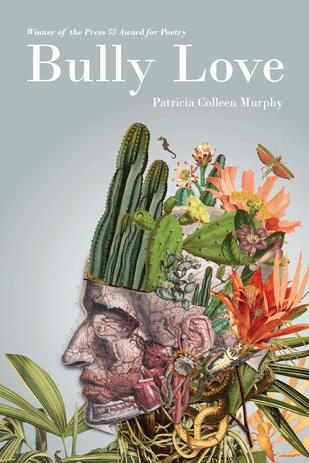Bully Love by Patricia Colleen Murphy

Paperback: 84 pages
Publisher: Press 53, April 1, 2019
Purchase @ Press 53
Review by Jennifer Martelli.
In her poem, “A Frog’s Courage,” Patricia Colleen Murphy writes
But this is porous country.
What else hasn’t mother told me?
//
Her ashes belted
in the back seat
like a baby.
The poems in Murphy’s Bully Love, winner of the Press 53 Award in Poetry, recount the body as it is changed by movement, by climate, and by trauma. A vast collection, Bully Love crosses a continent and generations using language that reflects a hybridity, a “porous” nature to place and emotion, blending into
halos of lichen crowning the rock: an alliance
between two kingdoms: fungus and algae, a partnership
without soil, shimmering like a blissful spill.
I was struck by the dramatic cover art of Bully Love, done by Bedelgeuse, “an anatomical collage artist,” using mixed media—cut paper and digital images—the works centers around the human anatomy. So, we are introduced to the book by a profile—a human head—with a clear, venous highway, the skull opened to desert flora, as well as a dragonfly and a seahorse. The collage prepares the reader for an “incision sealed with asphalt,” at that place where “Temperatures converge and compete for all the dark/pockets of my body.”
Geography is merged with parenthood—the speaker’s parents, in-laws, and her own childlessness and we travel from Maryland to Ohio to the Sonora Desert. Geography shifts, as does memory, becoming part of the body. In “How to Make a Lake,” the speaker tells us, “At night I feel the lake filling, rising, so that when/I bleed the east squeezes my womb like a lemon.” The choice to remain without children becomes an act of magical thinking, a guilt, but also a way to speak of family trauma. In “Mia,” Murphy writes, “I think if only I had procreated maybe/my parents would not have gone insane.” The speaker’s emotional and geographical move is reflected by the language of place, giving her the power to name. Murphy writes in “No Coats in October,”
by creosote, arroyos,
saguaro and alluvial tans
I remember him kissing my mother
before her fourth asylum,
like remembering
hayrides on autumn
evenings. Cornfields.
Switchgrass. Cows in mud.
Murphy’s power comes from language, and she claims that “My only power is this ability to name.” As the first mythical mother, or the precise poet, she picks “fruit more carefully than Eve.” The speaker exerts control over her body, her place, and the narrative. In “Tell Your Story Waking,” she writes,
There are two ways to tell a story.
When I was fifteen you went mad and I saved you.
When I was fifteen you went mad and I never forgave you.
Murphy—like the artist Bedelgeuse—layers textures and meanings, allowing the geography to inform her, to mutate. Look at the verbs in “Good Fences,” where “She tortillas the beans” and “the noon got drunker.” Language—and listening to language—can also be slippery, duplicitous, dangerous, reminding the reader of how trauma and geography can distort what we experience.
Is it due to our dread of moving that we suddenly hear them sing?
All my life I have not loved the plaintive calls of birds,
but in the underbrush we hear the Dean Martin of mourning doves,
Oh-we-oh-wooh-wooh. And his voice will spur us down the canyon,
the 1000 feet left to drop. It would be easier with wings
to soar over the alligator juniper, manzanita, yucca.
Bully Love is a tribute to the power of recreation. Patricia Colleen Murphy uses language as vast as a continent and as complicated as human anatomy as she writes “the poem that I’ve been trying to write/since writing started.” There are no solutions to trauma beyond language and movement in this place she creates, a place carved “like routes on a map to/someone else’s silence.” And these routes—these roots—are malleable, always changing, never to be completely trusted. Murphy ends Bully Love with the warning, the statement, “I need to tell you that the last thing I said/was insincere.” I loved this hard-won honesty resonating within the ever-changing borders of Murphy’s collection. Patricia Colleen Murphy empowers the speaker to claim her pain, her heritage, and the voice “of a person who was like me.”
Patricia Colleen Murphy won the 2019 Press 53 Award for Poetry with her collection Bully Love, published as a Tom Lombardo Poetry Selection. She founded Superstition Review at Arizona State University, where she teaches creative writing and magazine production. Her collection Hemming Flames (Utah State University Press) won the 2016 May Swenson Poetry Award, judged by Stephen Dunn, and the 2017 Milt Kessler Poetry Award. A chapter from her memoir-in-progress was published as a chapbook by New Orleans Review. She lives in Phoenix, Arizona.
